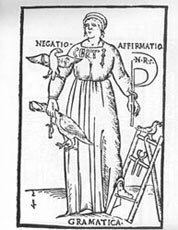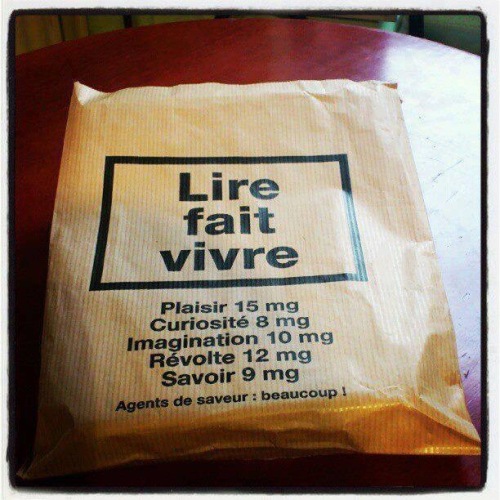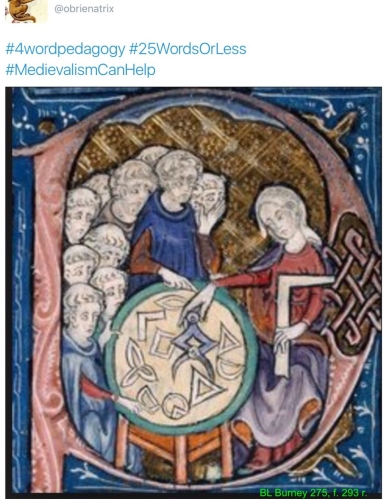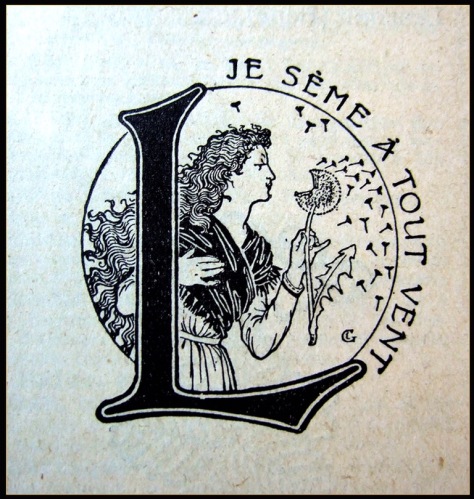- Writing about teaching and learning
- General resources
- Courses and syllabi
- Institutional formal official teaching portfolio documents (C.V. updated annually, other materials from October 2022 Peer Review of Teaching)
 I have the good fortune to be in a full-time academic job in the teaching stream, a parallel track to the research faculty stream. This is good for separating otium from officium and negotium, whilst maintaining a fluidly-intersecting area of otium negotiosum / sanctum.
I have the good fortune to be in a full-time academic job in the teaching stream, a parallel track to the research faculty stream. This is good for separating otium from officium and negotium, whilst maintaining a fluidly-intersecting area of otium negotiosum / sanctum.
I mostly teach French language; also literature in French and its cultural environment; and medieval literature, some of which is in French or from what is now France.
For most of my courses, at least some of the materials are openly available online. This is important to me personally and politically and because I work at a public institution in a democracy: to ensure that, for current and future courses, as much as possible is free for anyone to use; provided that such materials have been the product of fair labour, that they are properly credited and not commercially exploited, and that their use abides by Creative Commons BY-NC-SA licence terms.
Most of my teaching is not overtly or obviously medieval. This is a good thing to encourage thinking more creatively when teaching so as to bring in the medieval: medieval things, medieval teaching and learning, applied medievalism (of which here is a practical teaching example from a UBC class, and here are some more). Thinking when teaching, and thinking about teaching when teaching, make for better teaching (I think). It has also been my experience that something is more enjoyable if you’re being more imaginative and otherwise intellectually active while doing it, and that your enjoyment makes the thing more enjoyable for others involved. Spread the joy.

Resources
Some general stuff that might be useful to others:
- COVID-19: online teaching during the move to working from home (March-August 2020, for teaching and learning September 2020-August 2021); readings that were useful to me and might be useful for others, some sample activities, some free open access resources online such as films, some reflection and writing about teaching remotely.
- After that I didn’t write about teaching, or about anything else, while teaching online from September 2020 to August 2021. When we returned to campus in September-December 2021 one of my classes was online and the other two were (by my choice, to support students) hybrid / multimodal (that is, simultaneously both in physical and virtual person). I didn’t write on here, and barely thought, except once: “On work, overwork, folly, and resistance” (October 2021), which starts: “Last year I worked every weekend from mid-March to the end of September. […] Those weekends were in addition to weekdays and including working during one month’s contractual annual leave. As unpaid overtime. Every week that was at least 20% and at most 100%, assuming a regular working week to be 40 hours.” While that piece of writing is a different kind of resource from the others that follow below, it is at least as essential.
- THE RULES (syllabus part 2) (2018 version): aims and objectives, expectations, responsibilities, grading criteria, citation and plagiarism, late work, extensions and making up for missed work, and quick links to (my) university(‘s) rules, policies, and procedures.
- HELP (syllabus part 3) (2018 version): general useful openly-accessible freely-available UBC information. I use these resources a lot in the advising side of my work, you might also find them helpful, and they could also help you to help someone else. There are many people here at UBC who can help; even if it is “just” talking to someone with whom you feel comfortable and whom you trust, who will listen to you, that alone is already a vital service. Even if sometimes this seems like an overwhelmingly large university, and impersonal through its size and complexity: UBC is a compassionate caring community, made up of individual human beings. Departments, the student AMS, academic advising, UBC student support, stress, anxiety, sleep, well-being, exam preparation, safety, accidents, emergencies.
- REVISING FOR EXAMS (2018 version): revision guide for beginners’ French, general exam preparation and revision guidance, exam season guidance, and (local, UBC) exam practicalities
- ON READING, WRITING, AND COMMENTARY (2012, revised and links last checked 2016, minor tweaks 2018-22)
- A guide to the practice and limits of online commentary (PDF, 2008-12): for two medieval literature and culture courses in 2012 that involved student blog commenting (RMST 221: “INTRIGUE” and MDVL 302: “CRITICISM”; more on both of them in “Courses” below).
- Qu’est-ce que le commentaire ? (2017): Une version, adaptée aux besoins d’un cours sur la bande dessinée (FREN 336, Université de la Colombie-Britannique Vancouver), de plusieurs guides pratiques pour l’analyse textuelle et littéraire. / This is a shorter French version of “On reading, writing, and commentary,” for a UBC Vancouver course on bande dessinée.
- Comment lire la bande dessinée (et au-delà) (2017): pour le même cours / Reading (and) comics, medievalised: notes from the last—“meta”—week of that same bande dessinée course.
- Resources for writing in French on literature in French, for FREN 220 (2017):
ressources : les études littéraires
ressources : la langue et l’écriture
ressources : le commentaire
ressources : la dissertation - French monolingual, bilingual, and multilingual dictionaries:
resources: French dictionaries
resources: French grammar

Courses
Here are some courses I’ve designed and taught or currently teach, from 2008 onwards, including syllabus. Some are WordPress archived copies, some are at UBC Blogs (an institutional version of WP):
FRENCH LANGUAGE
- FREN 101 & 102: ab initio beginners’ French, to between CEFR (Common European Framework of Reference) level A1 and A2. (I also teach and have taught a bunch of others at assorted levels; beginners’ courses is what I’ve worked on, coordinated (2012-21), and designed)
= all now on UBC Canvas; archive UBC Blogs site (general course design, sample assignments, pandemical logistics) coming in late 2022
FREN 101 and 102 @ UBC Blogs (September 2018-April 2020)
—includes a case study in covidifying a large multiple-section course as a practical exercise in consent: making changes consensually, democratically, transparently, compassionately, and humanely (vs the usual opposite of all of these that usually characterises emergencies) during the public higher education “pivot” (March-April 2020)
FREN 101 (ARCHIVE) @ UBC Blogs (September 2013-June 2018)
FREN 102 (ARCHIVE) @ UBC Blogs (January 2014-August 2018)
- FREN 111 & 112 (now 201 & 202): intermediate French, CEFR level A2
(UBC Canvas)
- FREN 122 & 123 (now 301 & 302): contemporary French language and literature (post-Year 12 / antique traditional “first-year university French”), now redesigned as a CEFR level B1 course
(UBC Connect)
- French for Reading: an ab initio French course for (post)graduate students, for reading and research purposes. As the name suggests, this course is focussed on reading: taking students to what in the CEFR would be between a general B2 and a specialist C1-C2 level. A.k.a. “Du degré zéro à Derrida.”
Originally run (2005 & 2006) as a summer intensive course: six weeks, five days a week, three hours a day + three to four hours’ practice and homework a day; with maximum eighteen students.
The original site was at …princeton.edu/~julietobrien.
I’m working on adapting the syllabus, structure, and general design to a guided independent study version, for use by graduate students and others with similar reading requirements. The textbook used (and abused, because it is half a century old and therefore hilarious–its exemplary scholarly texts can be from the century before last–but, like a fine wine, also improves with age) is a solid classic: Karl C. Sandberg, French for Reading (1968). Used copies can be found via the usual online e-tailing suspects, and the full text is available in PDF through Scribd.com
- FREN 215: French conversation / oral practice for non-native speakers
at the traditional second-year university level (equivalent to CEFR B2 to C1 level)
(in French)
FREN 215 @ UBC Blogs
(access restricted to UBC people, though not just students, anyone with a CWL)

MEDIEVAL FRENCH & MEDIEVAL LITERATURES & CULTURES
- The Joys of Old French: Trinity College Dublin, Outreach course
(taught in English, texts read and worked on in a combination of Old French and modern English as students progressively learned Old French through their reading)
“JOYS, JEWELS, AND JAPERY” @iol.ie + WordPress site transfer some happy day
“READING MEDIEVAL FRENCH LITERATURE THROUGH TRISTAN ET ISEULT“
- FREN 220: Introduction to Early French Literature (up to the 17th c.) and to Textual Analysis
(in French)
FREN 220 @ UBC Blogs
- RMST 221: Romance Studies: Literatures and Cultures of the Romance World I: Medieval to Early Modern
(taught in English with original languages included for comparison; texts read and worked on in original or English depending on student programme and degree requirements)
“ANIMAL READING” @ UBC Blogs
“ADVENTURES”
“MISCHIEF”
“INTRIGUE”
- RMST 201: Introduction to Literatures and Cultures of the Romance World I: Medieval to Early Modern.
(somewhat similar to RMST 221 above; the topic that I chose was the course’s official description, “An introduction to the main themes that shaped the Romance World as its different national identities emerged in the Mediterranean sphere.”)
(UBC Canvas, archive UBC Blogs site coming in late 2022)
- MDVL 301A: Medieval European Literature of the 5th to the 14th centuries
(taught in English with original languages included for comparison; texts read and worked on in original or English depending on student programme and degree requirements)
“THE LIBERAL ARTS” @ UBC Blogs
- MDVL 302: Medieval European Literature of the 14th to the 16th centuries
(taught in English with original languages included for comparison; texts read and worked on in original or English depending on student programme and degree requirements)
“CRITICISM” @ UBC Blogs
- MDVL 310D: Topics in Medieval Studies
(taught in English with original languages included for comparison; texts read and worked on in original or English depending on student programme and degree requirements)
“MARVELS” @ UBC Blogs
- FREN 320: Advanced Studies in Literature from 1000 to 1700
(in French)
FREN 320 @ UBC Blogs
INCLUDES MEDIEVAL
- FREN 333: French civilization I: A historically-based approach to French civilization and culture from their origins (the dawn of human time and the domestication of fire) to the Third Republic (1875)
(in French)
FREN 333 @ UBC Blogs
- FREN 336: The Francophone World in Images
(in French)
“QU’EST-CE QUE LA BANDE DESSINÉE ?” @ UBC Blogs
- FREN 221: Introduction to Modern Literature (from the 18th c. onwards) written in French and to Textual Analysis
(in French)
FREN 221 @ UBC Blogs
- FREN 420L: Selected Topics in French Literature and Culture: “Éducations sentimentales: Perceptions masculines du féminin dans la littérature française des 18e et 19e siècles”
(in French)
“ÉDUCATIONS SENTIMENTALES” @ UBC Blogs
